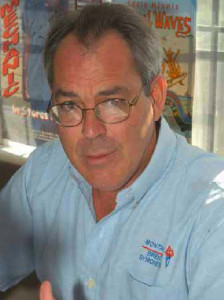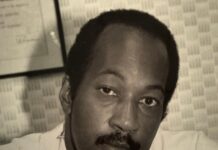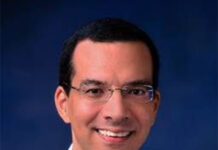
Nassau, Bahamas — An elderly woman from her porch on the Eastern Road this afternoon could be heard singing “IT IS FINISHED THE BATTLE IS OVER…” as the announcement came that Brent Symonette will no longer seek any nomination for the upcoming 2012 general elections.
The news shocked the country, which has floated for days in “WHISPERS”, which suggested senior FNMs will not be running in the upcoming race.
The Free National Movement Government however is late in naming all of its candidates, a task already completed by the PLP.
Symonette some believe is vacating his seat from the Parliament to avoid the public shaming and probing into Bahamas Hotmix, which holds a considerable contract with the government.
Bahamas Press can also confirm a major investigation may be commenced by the new government to probe the citizenship for votes policy enacted by Brent Symonette and the FNM Government. There will also be a major investigation in the Port and further examine Brent’s involvement there. Someone persons may be taken away in handcuff from what we hear.
A scandalous affair with the St. Anne’s MP also reveals a conflict with him as a shareholder in the Port deal, a fact which was never disclosed to the Parliament. Moreover, there is reaction to his announcement late this afternoon, where senior members of the party believe Brent was baggage #1 for the FNM and that he did not step down on his own.
The fact that his net worth considerably increased over the past two years, also concerned members of the FNM.
But while Symonette will not seek office he will manage the FNM campaign into the General Election.
Reader would remember it was Brent who Papa sent to fire the High Rock MP, Kenneth Russell. Many would also remember the wife of Brent had coached him to leave the Cabinet following the revelations by WIKI LEAKS where it was reported Hubert Ingraham spoke ill of the DPM and said he will never become Prime Minister. Sources close to the Brent camp tell us the DPM was hurt by the insults and was prepared to give it up. Brent we know had a dream and ambition to serve in the Parliament longer than his father, who served in the Lower House for over 60 years.
BP can also report axed from the FNM tree as predicted is Kenneth Russell, Alvin Smith and Earl Deveaux. Interestingly, Deveaux was absent from tonight’s FNM event.
BP understands the FNM intends to call the general elections before the end of January.
What was interesting though in this breaking story is this, Hubert Ingraham








Brent Symonette before you leave, your intelligence as a person who wants to be prime minister requires a few things. Who is Hubert Alexander Roberts born to Marie Roberts on November 2nd 1947 in Nassau and how is it that Laroda has a malato male child born on the same date. Why is it that occulticism and and intimidation the way of politics when the people you govern cannot see the callousness in pursuit of oligrachy abuse of power, privilege and down right disregard of the rights as human beings to every person equally in the Bahamas. Is it true that Money laundering and cocaine economics have been big business for the past two and a half decades in the Bahamas. Haiti’s role is to provide a commercial service” for the Colombians and the Dominicans, or, alternatively, to move it through the Turks and Caicos and the Bahamas, says a U.S. official.PORT-AU-PRINCE: Drug traffickers taking advantage of Haiti’s location, weak institutions and novice police force, have turned the country into a major transshipment center for cocaine en route from Colombia to the United States. In 1996, an estimated 5 to 6 percent of all the cocaine destined for the United States was moving through Haiti. By the end of 1997, the figure had jumped to 19 percent and climbing. By some estimates, that means up to 50 tons annually pouring through Haiti. “When it comes to the matter of illegal narcotics, I must report to the Senate that the situation in Haiti is grave and even approaching a crisis,” Sen. Mike DeWine, R-Ohio, told the Senate after visiting Haiti this year. “Because of Haiti’s weak political and economic condition, this country is becoming increasingly attractive to international drug traffickers,” he added. “The United States must pay close attention for there is a threat that Haiti could turn into a full-fledged narco-state.” Haiti’s role is to provide a commercial service” for the Colombians and the Dominicans, or, alternatively, to move it through the Turks and Caicos and the Bahamas, says a U.S. official.“The improvements are noteworthy,” says Denize, but adds that “the missing parts are just as noteworthy. The Haitian Coast Guard, for all of this coastline, has four Boston Whalers and a refurbished 40-foot Haitian army Coast Guard cutter.” While transshipment is the biggest problem, Denize says there are clear indications of money laundering, particularly in real estate. “I think the prices of real estate, both in acquisition and rental, are very deeply affected by the economics of drug trafficking. What we have is an overwhelming activity in terms of money laundering, where a house is worth $50,000 and a guy comes in and says how would you like to sell me your house for $300,000? This is really what’s happening, you know.” While Colombian traffickers use Haiti as a trampoline to ship some of their cocaine to American streets, they’re wreaking havoc in Haiti, too. Break-ins and armed robberies, rare a few years ago, are now common, and Haitians believe that to be a product of the drug trade. More than 100 police officers suspected of working for drug dealers have been kicked off the force, raising Haitians’ mistrust of the young department. Many Haitians say the cocaine trade has not only worsened the crime problem, but has also contributed to the breakdown of Haitian society. They point to mansions sprouting in the mountains above this city and gas stations under construction as evidence of illicit gains or money laundering. MANY USERS – Researchers found that users, many of them street children addicted to glue, paint thinner or gasoline, are getting younger. Some graduate to cocaine, financing their habit by washing cars or stealing. Older ones become dealers. “Haitian society is in complete denial,” said Gaetane Auguste, executive director of Haiti’s only treatment center. The cocaine that stays in Haiti, reputed to be of high quality, is only a small part of the trade. Young Haitians who have lived overseas have only recently begun to experiment with the drugs. Marijuana and cocaine were rare in Haiti during the 30-year Duvalier family dictatorship, when the state security apparatus eyed suspiciously any “rebel” trends. During that time, major traffickers such as Colombian Carlos Lehder used other available routes, primarily the Bahamas, as transshipment points. As Haiti disbanded its army and the paramilitary Tonton Macoutes, traffickers with mountains of cash found it easy to make new friends there.LÉOGÂNE, Haiti — For Del Lydes, the drug planes that circle over the cornfields have become as common as the flies that buzz around his cows. They swoop down past the trees and roll to a stop along the two-lane road that slices through the fields. Then men with machine guns stash their cargo — cocaine — into cars. “Around here it is a cocaine area,” Mr. Lydes said. “A lot of people have moved. But others come at night to wait for the planes.” The “others” are his impoverished neighbors, who gather in hope of snatching a few bags of cocaine they can then sell for a fraction of the drug’s street value in the United States. Recently gunmen kept a mob at bay while unloading the drugs, then abandoned the plane. The angry crowd tore it apart in a vain search for drugs. “People think they are going to get rich from cocaine,” Mr. Lydes said. “When they see a plane they gather around, but when the pilots see them they scare off the plane.” Unwittingly, these mobs have become perhaps Haiti’s only front-line deterrent to the Colombian cocaine traffickers, who, ever adept at finding a weak spot in the Caribbean through which to funnel their drugs northward, have flocked to impoverished Haiti bringing cash, crime and corruption. Haiti’s inexperienced, understaffed and underpaid police force and courts have proved irresistible to smugglers who ferry cocaine aboard speedboats and small planes before hiding it in ships bound for Miami and Puerto Rico, or just trucking it into the neighboring Dominican Republic. “My only broad-gauge assessment is that Haiti is a disaster,” said Gen. Barry R. McCaffrey, director of the United States anti-drug effort. “We’ve got weak to nonexistent democratic institutions, a police force that is on the verge of collapse from internal corruption and an eroding infrastructure that is creating a path of very little resistance. We are watching an alarming increase.” The U.S. government estimates 67 tons, or 14 percent, of all cocaine destined for the United States from South America came through Haiti in 1999, up from 54 tons, or 10 percent, in 1998. Haiti “is descending into frightening depths of drug corruption and violence,” Rep. Benjamin Gilman, R-N.Y., chairman of the House International Relations Committee, told a congressional hearing. “Haiti’s weak democratic institutions, fledgling police force and eroding infrastructure provide South American-based narcotics traffickers with a path of very little resistance,” the report said. Sources in Haiti familiar with the drug trade there question whether the transit .They also note that the nature of the transit problem in Haiti is changing from so-called go-fast boats from Colombia bringing cocaine to the country’s southern peninsula to single-engine planes ferrying it to the north of Haiti. From there it is shipped by freighter to the United States, with Cap-Haitien and Fort-Liberte the north coast departure ports of choice problem is getting worse or it is “just now getting light shone on it”. Varone cited, among other things, Haiti’s location, its “tenuous political situation , lack of law enforcement infrastructure and/or marine enforcement capabilities and the corrupting influence of drug trafficking,” which has allowed drug smugglers to “operate there with impunity.” Cocaine planes taking off from Colombia en route to Haiti are benefiting from Venezuela’s refusal to allow U.S. drug surveillance planes to use its airspace, U.S. officials say. “As a result, we believe that drug smugglers are now using Venezuelan airspace to thwart law enforcement . . . , ” John Varone, a high-ranking Customs official, told a House subcommittee . Pierre Denize, chief of Haiti’s fledgling police force, acknowledged in a recent interview that the drug problem in Haiti “is very serious in terms of volume and also in terms of impact. It carries its own brand of violence and brings with it arms trafficking and in general organized crime sectors that benefit from it.” http://www.latinamericanstudies.org/haiti/scourge.htm
Comments are closed.